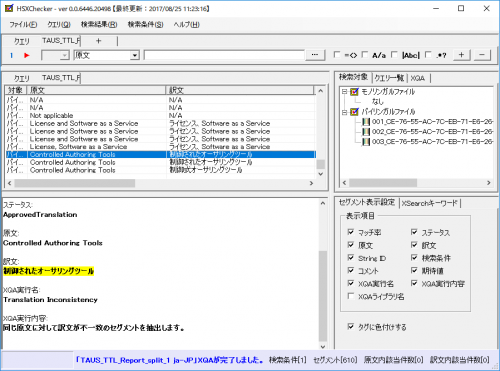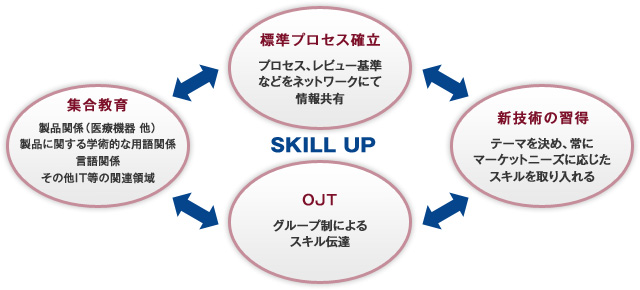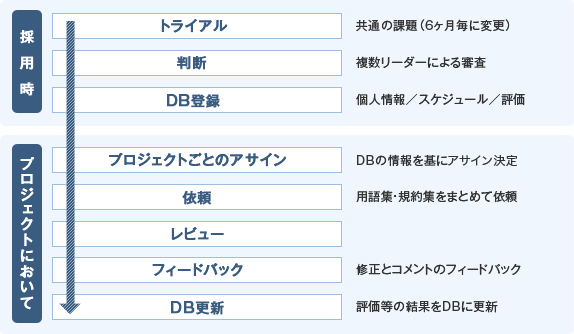Quality Management System
At Human Science, we have established a unique quality control system based on various know-how cultivated through our past experiences, which we provide to our customers.
Quality Control for Translation
Thorough Hearing at the Time of Order
Even when we simply say "translation," there is a significant difference in the outcome between a text that is translated as faithfully as possible to the original and a text that is heavily paraphrased with a specific audience in mind. We conduct thorough preliminary hearings to fully understand what our clients seek in their translations and to respond to their requests to the best of our ability.
Terminology Standardization and Management
One of the important elements of translation is terminology management. Unifying terms by assigning fixed translations to specific terms is a fundamental requirement for accurate translation. However, since key terms differ by field and even by client, managing terminology to ensure proper usage throughout the entire document being translated can be a complex task.
QA check using our in-house developed tool HS XChecker
At Human Science, we use our uniquely developed checking tool, XChecker, to quickly verify compliance with style guides and glossaries.
Supports various file formats and can detect errors that are difficult for the human eye to catch, such as numerical inaccuracies and inconsistencies in translations, leading to a significant reduction in work time.

HS XChecker Screen
Support for large-scale translation using the translation assistance tool Trados
In the pharmaceutical and medical fields, there are often cases where multiple translations of similar content occur in succession, or where a large volume of translations needs to be completed in a short period of time. In such cases, it is necessary to deploy multiple translators simultaneously and to proceed with the work while coordinating with each other at the operational level.
Our company has established a system where dedicated account managers appropriately control multiple translators while maintaining quality levels to manage projects. Additionally, the use of translation memory tools (Trados) is also available as needed.
- Full Review Implementation
Full review by a specialized reviewer
At Human Science, we believe that one of the key factors affecting the quality of translation is the review (check) process after the translation work. Therefore, we have a system in place where experienced professional reviewers (checkers) thoroughly check the entire translation.
This process detects and appropriately corrects errors and mistakes made by translators during their work stages. Additionally, it enhances the accuracy of translations from a professional standpoint and contributes to the stabilization of overall translation quality by mutually adjusting translations from multiple translators.
In-house Training and Standardization
We have established specialized teams such as the "Standardization Promotion Committee" and the "Technical Promotion Committee" within the company, working to enhance the individual skills of our staff for quality management and improvement, as well as to establish and enforce standard processes.

Management of Translators
In the strict recruitment process for translators, we conduct translation trials to quantitatively and qualitatively evaluate individual abilities, and only those translators who achieve a certain score are registered.
Implementation of Feedback for Translators
We have established a system to provide feedback on the internal review results to all translators after the completion of work.
In providing feedback, we promote continuous quality improvement not only by giving a score but also by pointing out specific areas to the translator and suggesting corrections.
Centralized Management System for Translators through Database Integration
We have established a system to centrally manage the work performance and evaluations of translators (client evaluations, internal evaluations) and feedback through database management, allowing us to select the most suitable translator for each project.
・Conduct detailed interviews to understand the potential and areas of expertise of translators, and register them in the database
・Determine the rank of each translator based on the points in the database after feedback
→ Reflect in the selection of the optimal translator for the next time



